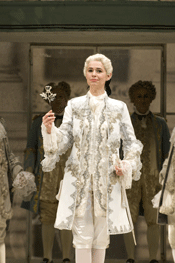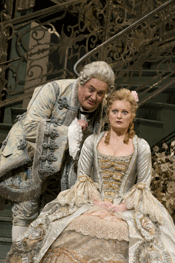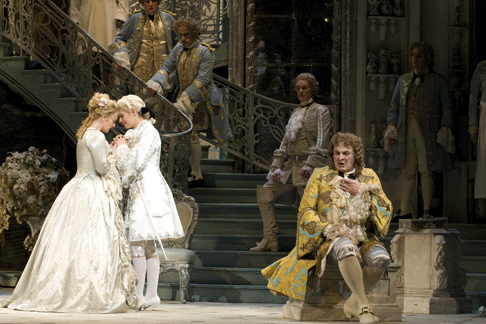Recently in Reviews
English Touring Opera are delighted to announce a season of lyric monodramas to tour nationally from October to December. The season features music for solo singer and piano by Argento, Britten, Tippett and Shostakovich with a bold and inventive approach to making opera during social distancing.
This tenth of ten Live from London concerts was in fact a recorded live performance from California. It was no less enjoyable for that, and it was also uplifting to learn that this wasn’t in fact the ‘last’ LfL event that we will be able to enjoy, courtesy of VOCES8 and their fellow vocal ensembles (more below …).
Ever since Wigmore Hall announced their superb series of autumn concerts, all streamed live and available free of charge, I’d been looking forward to this song recital by Ian Bostridge and Imogen Cooper.
The Sixteen continues its exploration of Henry Purcell’s Welcome Songs for Charles II. As with Robert King’s pioneering Purcell series begun over thirty years ago for Hyperion, Harry Christophers is recording two Welcome Songs per disc.
Although Stile Antico’s programme article for their Live from London recital introduced their selection from the many treasures of the English Renaissance in the context of the theological debates and upheavals of the Tudor and Elizabethan years, their performance was more evocative of private chamber music than of public liturgy.
In February this year, Albanian soprano Ermonela Jaho made a highly lauded debut recital at Wigmore Hall - a concert which both celebrated Opera Rara’s 50th anniversary and honoured the career of the Italian soprano Rosina Storchio (1872-1945), the star of verismo who created the title roles in Leoncavallo’s La bohème and Zazà, Mascagni’s Lodoletta and Puccini’s Madama Butterfly.
Evidently, face masks don’t stifle appreciative “Bravo!”s. And, reducing audience numbers doesn’t lower the volume of such acclamations. For, the audience at Wigmore Hall gave soprano Elizabeth Llewellyn and pianist Simon Lepper a greatly deserved warm reception and hearty response following this lunchtime recital of late-Romantic song.
Collapsology. Or, perhaps we should use the French word ‘Collapsologie’ because this is a transdisciplinary idea pretty much advocated by a series of French theorists - and apparently, mostly French theorists. It in essence focuses on the imminent collapse of modern society and all its layers - a series of escalating crises on a global scale: environmental, economic, geopolitical, governmental; the list is extensive.
For this week’s Live from London vocal recital we moved from the home of VOCES8, St Anne and St Agnes in the City of London, to Kings Place, where The Sixteen - who have been associate artists at the venue for some time - presented a programme of music and words bound together by the theme of ‘reflection’.
'Such is your divine Disposation that both you excellently understand, and royally entertaine the Exercise of Musicke.’
Amongst an avalanche of new Mahler recordings appearing at the moment (Das Lied von der Erde seems to be the most favoured, with three) this 1991 Mahler Second from the 2nd Kassel MahlerFest is one of the more interesting releases.
‘And there was war in heaven: Michael and his angels fought against the dragon; and the dragon fought and his angels, And prevailed not; neither was their place found any more in heaven … that old serpent … Satan, which deceiveth the whole world: he was cast out into the earth, and his angels were cast out with him.’
If there is one myth, it seems believed by some people today, that probably needs shattering it is that post-war recordings or performances of Wagner operas were always of exceptional quality. This 1949 Hamburg Tristan und Isolde is one of those recordings - though quite who is to blame for its many problems takes quite some unearthing.
There was never any doubt that the fifth of the twelve Met Stars Live in Concert broadcasts was going to be a palpably intense and vivid event, as well as a musically stunning and theatrically enervating experience.
‘Love’ was the theme for this Live from London performance by Apollo5. Given the complexity and diversity of that human emotion, and Apollo5’s reputation for versatility and diverse repertoire, ranging from Renaissance choral music to jazz, from contemporary classical works to popular song, it was no surprise that their programme spanned 500 years and several musical styles.
The Academy of St Martin in the Fields have titled their autumn series of eight concerts - which are taking place at 5pm and 7.30pm on two Saturdays each month at their home venue in Trafalgar Square, and being filmed for streaming the following Thursday - ‘re:connect’.
The London Symphony Orchestra opened their Autumn 2020 season with a homage to Oliver Knussen, who died at the age of 66 in July 2018. The programme traced a national musical lineage through the twentieth century, from Britten to Knussen, on to Mark-Anthony Turnage, and entwining the LSO and Rattle too.
With the Live from London digital vocal festival entering the second half of the series, the festival’s host, VOCES8, returned to their home at St Annes and St Agnes in the City of London to present a sequence of ‘Choral Dances’ - vocal music inspired by dance, embracing diverse genres from the Renaissance madrigal to swing jazz.
Just a few unison string wriggles from the opening of Mozart’s overture to Le nozze di Figaro are enough to make any opera-lover perch on the edge of their seat, in excited anticipation of the drama in music to come, so there could be no other curtain-raiser for this Gala Concert at the Royal Opera House, the latest instalment from ‘their House’ to ‘our houses’.
"Before the ending of the day, creator of all things, we pray that, with your accustomed mercy, you may watch over us."
Reviews
![Soile Isokoski as the Marschallin [Photo by Mike Hoban courtesy of The Royal Opera]](http://www.operatoday.com/Isokoski_Marschallin.gif)
10 Dec 2009
Der Rosenkavalier - Royal Opera House, London
In dark, damp December we need good cheer, and Der Rosenkavalier at the Royal Opera House, delivers colour and spectacle. in abundance. It's a revival of the John Schlesinger production from 1884, and somewhat antiquated, but that's no disadvantage, for the passage of time haunts Der Rosenkavalier.
The Marschallin knows she’ll never be young again, and accedes to a new generation with whom the future lies. She was herself once like Sophie, forced into marriage by social convention. Strauss depicts a Vienna that by 1911 was about to be swept away. Even Octavian and Sophie have long gone, like “Schnee vom vergangenen Jahr.” Obviously in this revival, the costumes (Maria Björnsen) are new-made, and the sets (William Dudley) have been refreshed, but the air of musty decay is deliberate, because it’s an essential part of the narrative. This gorgeously gilded world is built on false values. By supporting Sophie and Octavian, the Marschallin is placing her faith in love.
There are those who think operas should be museum pieces, preserved forever at the moment of birth. In real life, though, every revival is a new work because the people involved are coming new to it. Even if they’ve sung the roles many times before, the specific demands of performance create a new dynamic. Directing revivals isn’t easy, because everyone has to be inspired all over again.
 Sophie Koch as Octavian
Sophie Koch as Octavian
Soile Isokoski is one of the greatest Strauss singers of our times. Her experience, and reflective, emotional depth could have made this an exceptionally well-rounded Marschallin. Isokoski’s voice has a smoky, wistful timbre that captures the Marschallin’s true personality. For whatever reason, in this production, Isokoski’s subtle approach seemed sidelined. Because so much is going on in the second act, it’s easy to forget how the Marschallin permeates the opera even when she’s not present. She was kleine Resi, just as Sophie is now. What happens in Faninal’s mansion may well have happened in her father’s home. She may not appear again until the end, but it’s “her” story, reprised anew.
 Peter Rose as Baron Ochs and Lucy Crowe as Sophie
Peter Rose as Baron Ochs and Lucy Crowe as Sophie
the production is so high on visual values, the balance shifts to Octavian, who is, after all the Rosenkavalier, the personification of youth and the future. Sophie Koch is good, even her slight weaknesses play well into the character’s immaturity. More gusto in the “dialect” passages would have been welcome, connecting to the social satire in the plot. Who knows what Octavian might become when he grows older? Lucy Crowe’s Sophie is well acted, bringing out the spoilt brat aspects of the role. Octavian might have a hard time. Strauss had Pauline, so he knew very well that in real life marriages don’t follow the “rules” of society.
There’s a strong element of subversion in this opera, often overlooked in the frills and frou-frou. Strauss sends up the social order, parodying Viennese waltzes, depicting the baseness of aristocratic rule. Peter Rose’s Baron Ochs is suitably brutish. Even a nobleman as debased as he would have been marginally literate, but von Hoffmansthal points out his illiteracy clearly, so it can’t be missed. Strauss builds similar crudity into the music, which Rose might have made more grotesque, but it wouldn’t have worked against Kiril Petrenko’s civil and well behaved conducting. It was good, too, to hear two other Grandees of British opera, Thomas Allen and Graham Clark, as Faninal and Valzacchi.
 Thomas Allen as Faninal, Lucy Crowe as Sophie and Sophie Koch as Octavian
Thomas Allen as Faninal, Lucy Crowe as Sophie and Sophie Koch as Octavian
This revival (directed by Andrew Sinclair) won’t go down as one of the great moments in performance history, because it lacks the fire and pain that lies in the score. Nonetheless, it’s still immeasurably better value than the usual level of “festive fare” on offer at this time of the year. Even if it’s muted, it’s still a decent artistic experience.
Anne Ozorio
![Soile Isokoski as the Marschallin [Photo by Mike Hoban courtesy of The Royal Opera]](http://www.operatoday.com/Isokoski_Marschallin.gif)


